Should SA be worried? Inside West Australia’s battle to secure Defence contracts.
An SA Senator has fired a new salvo at WA’s Premier, saying the ex-Naval lawyer was “out of his depth” as he fights to take high-value maintenance contracts from South Australia.
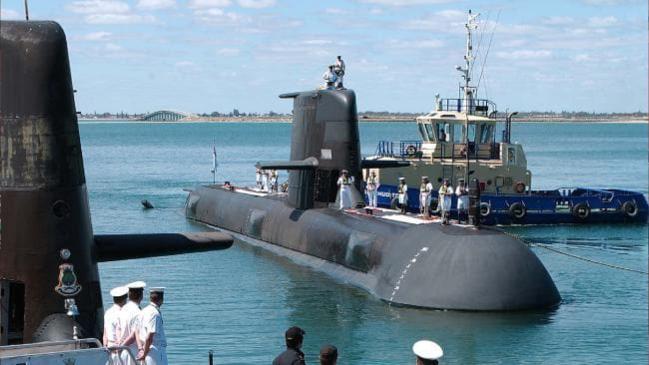
SA News
Don't miss out on the headlines from SA News. Followed categories will be added to My News.
South Australian Senator Rex Patrick has fired a personal missive at West Australian Premier Mark McGowan as the battle over a lucrative submarine maintenance contract intensifies.
The two former Australian Navy officers have traded verbal blows with Senator Patrick describing Mr McGowan as “out of his depth” after the WA Premier described the Centre Alliance Senator’s behaviour in Canberra as appalling.
“Premier McGowan is a former Navy lawyer used to wading in the shallow waters nearby the shore, Senator Patrick told the Sunday Mail.
“In relation to this discussion, he is out of his depth.
“I’m a former submariner operating well within depth margins.”
In an exclusive interview with the Sunday Mail Mr McGowan said a decision over what state should get the contract for Full Cycle Docking of Collins Class submarines should be done in the national interest — not via dodgy deals in Canberra.
He described a push by Senator Patrick — to keep pressure on the Morrison Government to keep sustainment in SA — as “so wrong on so many levels.”
“To threaten other legislation on the basis of contracts that might be issued by the Federal government in the national interest and security is just appalling.”
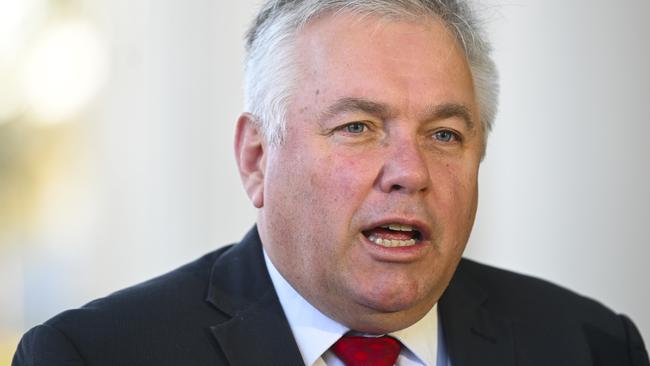
He said the government “should not be spooked by scare campaigns in South Australia and just do the right thing by the country.”
Senator Patrick said he would make no apologies for standing up for the interests of his home state.
“Centre Alliance is exclusively an SA party and, as such, SA is our dominant focus,” he said.
“We make no apologies for standing up for our state … Having said that, we would never propose something to Government that does not make sense from an SA or national perspective,” Senator Patrick said.
It is not the first time the debate has got pointy.
In August Mr McGowan told the WA parliament SA Premier Steven Marshall would “not know a submarine from a limousine”.
“He wouldn’t know the difference between a periscope and a stethoscope,” Mr McGowan said.
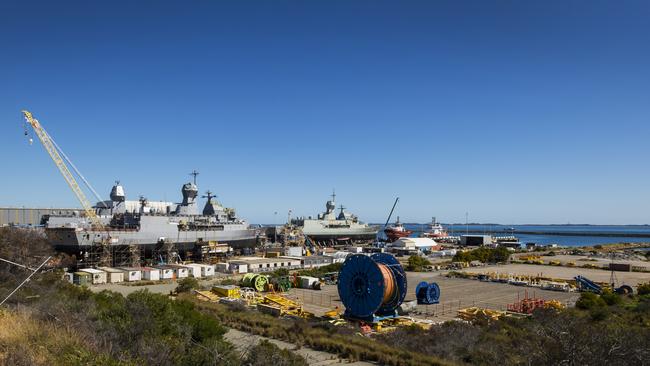
Tug of war
With WA aggressively campaigning to snare hundreds of Adelaide submarine maintenance jobs, the Sunday Mail, enters enemy territory to discover what is driving the West’s push to take over the lucrative defence work and its massive operation to get war-ready.
From his office in parliament West Australian Premier Mark McGowan has an uninterrupted view of the Perth skyline.
The skyline is punctuated by the branding of some of the world’s largest resource companies — Rio Tinto, Woodside, BHP Billiton, South 32 — names that will always be linked to a mining boom described by some as a once in a century event.
During the peak of the boom, that stretched from 2003 to 2014, about 1000 people were moving to Western Australia each week.
The promise of six-figure salaries working fly-in, fly-out mining jobs and affordable house-and-land packages in brand new suburbs close to the beach drew people from all over the world.
But it could not last forever and didn’t. By 2014 the boom crashed.
The effects were measured in the decline of house prices and the number of jet skies for sale on Gumtree.
A mining recovery has started but about 100,000 West Australians are now looking for work. The McGowan Government knows that it needs to diversify WA’s economy.
So why should South Australia care?
Because the former naval officer has his eyes on something South Australia has made its own — defence.
Mr McGowan and his Defence Issues Minister Paul Papalia have launched a major campaign to wrest future submarine maintenance of Collins Class submarines from SA.
The pair have argued SA does not have the skilled workforce capable of filling the jobs necessary.
Mr Papalia argues that, unlike the mining boom, workers in the defence sector in the future will be homegrown.
SA Premier Steven Marshall, agrees some skilled migration will be needed to fill future job demand in Adelaide, but is confident his state will have no problem creating the skilled workforce needed.
His argument was bolstered this week when a report surfaced that raised a raft of concerns about shifting future Full Cycle Docking to WA.
Mr Marshall also points to a recovery in the resources sector meaning many of the former mining workers will be likely to go back to the jobs that bought them to WA in the first place.
Mr McGowan’s other major argument is submarines should be maintained close to where they are based, the Royal Australian Navy base HMAS Stirling, on Garden Island, south of Perth.
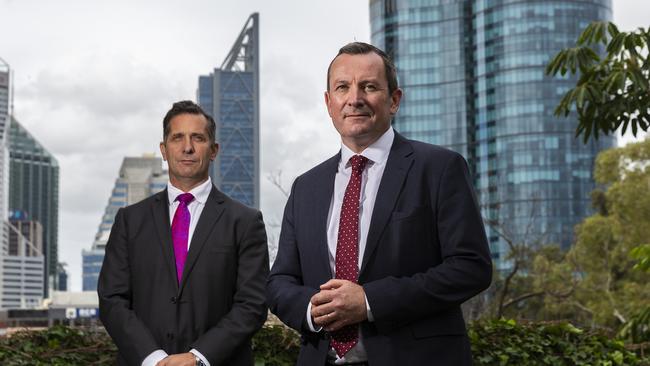
“Submarine crews do not live in Adelaide, they live in Perth,” he says.
“I am not aware of any navy that does not do the major maintenance in proximity to where the submarines are based — so America, China, Russia, France.”
Mr Papalia, a decorated former navy diver, agrees, conjuring national security fears — a sentiment that will no doubt be played on as the battle for the sustainment work continues.
“West Australia is the closest to the areas of operations for our fleet now and into the foreseeable future,” he said.
Mr Marshall disagrees, arguing the maintenance needs to be based where the design capability is.
Full-cycle docking effectively requires submarines to be cut in half, rejuvenated and joined back together.
“Full-cycle docking is not a quick job,” Mr Marshall points out.
“It is a process that takes up to two years, so quite frankly it needs to be located where it is most effectively done and that is SA.”
Mr Marshall correctly points out that “SA is the defence state.”
But in a sign of how interested his state is in the sector, Mr Papalia is WA’s first ever Defence Issues Minister, sworn in following the 2017 state election when Labor took government.
By the end of last year — partly prompted by the suggestion of SA’s then Federal Defence Minister Christopher Pyne, according to Mr Papalia — WA had put together a Defence Industries Strategic Plan.
One of the six key priorities listed in the plan is “Developing Strategic Infrastructure” including a commitment to improving the Henderson Precinct and neighbouring Australian Maritime Complex (AMC) one of just two locations identified in Australia for naval ship building.
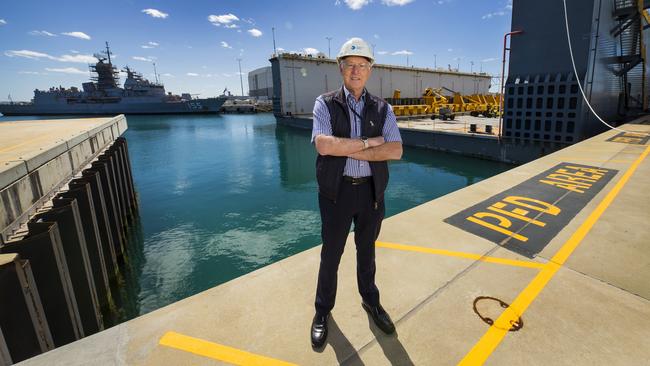
ASC undertakes Collins Class sustainment work at both these locations — Adelaide’s Osborne Naval Shipyard and the Henderson Precinct, just south of Fremantle.
It was also the author of the interim report Mr Marshall unveiled during the week that Mr Marshall described as a ‘body blow’ to WA.
A request from the Sunday Mail to tour both sites was refused by the company.
But the WA State Government opened the gates to the state-owned Australian Marine Complex Common User Facility (CUF) — a 40ha integrated fabrication and assembly site with an open access policy for multiple users.
CUF is surrounded by an industrial area catering for four industry sectors — oil and gas, resources, marine and defence.
On one wharf the dismantling of the HMAS Darwin is being undertaken while, down the road, luxury yacht makers are thriving in what Mr McGowan describes as the most successful private shipbuilding precinct in the world.
AMC Management director Mike Bailey says the different industry sectors complement each other and will contribute to the ongoing success of the defence industry.
“There is nothing like it in the world,” Mr Bailey says.
In the precinct is Civmec, a company that helped provide the steel and concrete to construct the new 60,000-seat Perth stadium — the largest sporting arena and entertainment venue in Perth.
The company has also provided equipment for some of world’s largest ever oil and gas projects including the Chevron Gorgan LNG project.
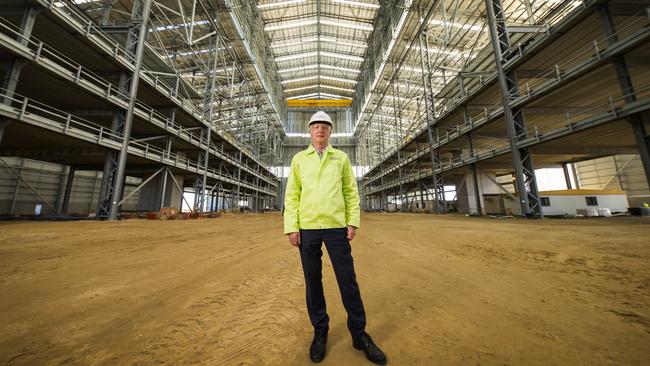
Civmec’s executive chairman Jim Fitzgerald, regarded as a titan of industry, describes the most recent WA resources boom as a once in 100-year event.
“In 1998 West Australia was in an industrial recession. It was a disaster,” he says, adding that by 2013, after about 10 years, the boom was gone.
“Will it happen again? No. I would loved to be proved wrong, but I don’t think I will be. What is here now is defence and shipping.”
To prove his last point, the man regarded as an industry titan, shows the Sunday Mail through a giant shed that is 70m tall, 136m wide and 215m long.
It is large enough to house 14 offshore patrol vessels or two air warfare destroyers.
It is here where the company will undertake work on offshore patrol vessels.
The scale and scope of the Henderson precinct, and the willingness for companies such as Civmec to shift from traditional WA industries like oil and gas to defence, is something that could make SA nervous.
Mr Bailey can easily point out where sustainment work could be facilitated.
However, it also gives SA one of its greatest opportunities to counter WAs push into SA territory.
Mr Papalia has commissioned a report to identify the future infrastructure needed to create the defence ship building industry the state wants for the next 30 years.
That work will cost money and Mr Papalia knows it.
Infrastructure needed for the sustainment contract alone is going to require significant levels of Federal funding.
“Defence needs to provide the money for the infrastructure, we will provide the land,” he says.
“It is not an ask, it is their job, their role.
“It is always going to be defence that has to build a shed to fix submarines in, that is their job.
Mr Papalia says it could cost “roughly $200 million for a shed and associated infrastructure.”
It is not an insignificant ask, but it leads to another possible problem SA may face — the political implications surrounding any decision about defence builds in WA including the sustainment contract.
Mr McGowan acknowledges the impact Mr Pyne had on creating a defence building industry in SA. But he describes a push by SA Centre Alliance Senator Rex Patrick — to keep pressure on the Morrison Government to keep sustainment in SA — as “so wrong on so many levels.”
“To threaten other legislation on the basis of contracts that might be issued by the Federal government in the national interest and security is just appalling.”
He says the government “should not be spooked by scare campaigns in SA and just do the right thing by the country.”
Senator Patrick dismisses the suggestion.
Centre Alliance is exclusively an SA party and, as such, SA is our dominant focus.,” he said.
“We make no apologies for standing up for our state on this critical issue.
“Having said that, we would never propose something to Government that does not make sense from an SA or national perspective.”
During the week SA Labor took out full a full-page advertisement in The Advertiser pledging its support for subs jobs to stay in Adelaide.
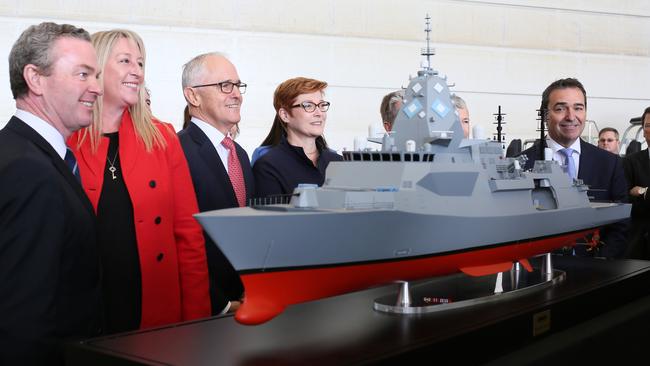
Opposition leader Peter Malinauskas has even promised to stand side-by-side with Mr Marshall to fight for the jobs.
Mr Papalia acknowledges the politics behind any decision that could be made.
During the weeks he suggested “grubby deals in Canberra” should not get in the way of the decision.
After the May Federal Election, when Mr Pyne quit politics, the two most senior roles in defence have been secured by West Aussies.
Linda Reynolds is the Defence Minister and Melissa Price is the Defence Industries Minister.
Like Mr Pyne before them, the expectations to deliver for their home state are huge.
“He (Pyne) is admired for his capacity to deliver for his state,” he says. “All I would say is that expectations are high in West Australia because they saw what Christopher Pyne did and we now have two West Australian Ministers responsible for defence.
“Expectations are high.”
“In WA the Liberal Party has had an overwhelming majority of the House of Reps seats
“Last (federal) election nothing changed hands.
“They have everything to lose in West Australia.”
It also comes as Federal Labor leader Anthony Albanese has vowed to visit WA once every six weeks in a bid to win seats at the next federal election.
But Mr Marshall is confident SA can weather a perfect political storm.
“I am convinced unequivocally that it is in the best interest of the nation to continue to do the full cycle docking in South Australia — the home of the Collins Class.
“We have got the design skills and we have got the fabrication skills
“We’ve got it right and we deserve to keep it here in South Australia and I am confident that is what is going to happen.”
